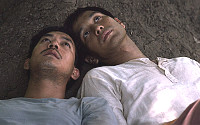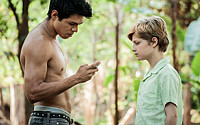| SHADOWS ON THE WALL | REVIEWS | NEWS | FESTIVAL | AWARDS | Q&A | ABOUT | TALKBACK | |||||||||||||||
 Shadows off the beaten path Shadows off the beaten path | |||||||||||||||
| Indies, foreigns, docs, revivals and shorts... | |||||||||||||||
|
On this page:
EUTHANIZER |
MALILA: THE FAREWELL FLOWER MY LIFE WITH JAMES DEAN | SEEDS [Cuernavaca] < < F O R E I G N > > last update 18.Jul.18 See also: SHADOWS FILM FESTIVAL | |||||||||||||||
 R E V I E W B Y R I C H C L I N E
R E V I E W B Y R I C H C L I N E | |||||||||||||||
Euthanizer Armomurhaaja Armomurhaaja
| |||||||||||||||
|
dir-scr Teemu Nikki prd Teemu Nikki, Jani Poso with Matti Onnismaa, Jari Virman, Hannamaija Nikander, Heikki Nousiainen, Pihla Penttinen, Rami Rusinen, Ilari Johansson, Jouko Puolanto, Olli Rahkonen, Santtu Karvonen, Alina Tomnikov, Juha Lehti  release Fin 24.Nov.17,
release Fin 24.Nov.17, US 20.Jul.18 17/Finland 1h25
|  With a cartoonishly abrasive tone, this Finnish pitch-black comedy continually provokes the audience with its unexpected story and characters. With his hard-edged, almost growling style of filmmaking, writer-director Teemu Nikki intriguingly taps into the kind of barely suppressed anger that can make someone vote for the most insane political candidate imaginable, just to shake up the system. So the story feels like an eerie parable.
With a cartoonishly abrasive tone, this Finnish pitch-black comedy continually provokes the audience with its unexpected story and characters. With his hard-edged, almost growling style of filmmaking, writer-director Teemu Nikki intriguingly taps into the kind of barely suppressed anger that can make someone vote for the most insane political candidate imaginable, just to shake up the system. So the story feels like an eerie parable.
In a small town, local oddball mechanic Veijo (Onnismaa) does a roaring side-trade putting animals to sleep, because he's cheaper than the vet. But the way he lectures his clients ruffles a few feathers. That said, his compassionate attitude toward doomed pets is attractive to the somewhat morbid young nurse Lotta (Nikander), who begins to assist him, leading to an offbeat romance. Then he inadvertently crosses hotheaded wannabe white supremacist Petri (Virman). And as Veijo's anger at everyone around him boils over, he's on a collision course with a fuming, humiliated Petri. The themes are varied and strong. Veijo quietly makes jagged comments about the casual cruelty people inflict on pets, even if it's just out of ignorance. He locks one owner in a dog crate to make a point, and attacks a fisherman (Karvonen) as a "torturer" because he catches and releases salmon. Meanwhile, he's a bit taken aback that Lotta likes a bit of erotic asphyxiation. And there's the added irony that Veijo's loathed father (Nousiainen) is dying in hospital, always asking for more morphine. Performances are deadpan, layering quirks into characters that seem initially simplistic. But within their depths are ideas and actions that are far from what's usually seen in civilised society. Each actor dives into his or her role without apology, quietly adding textures that seem inexplicable to the people around them. At the centre, Onnismaa nicely mixes Veijo's bluntness with his vulnerability. And Virman gives a bravely unflinching turn as the increasingly pathetic Petri. As Veijo's loses patience with people who torment animals, he begins to think that they should pay for the pain they inflict. Including his father. And the town vet (Penttinen). Intriguingly, Veijo believes his task in life is to create the karma his father never believed in, which lends some uncomfortable resonance to his increasing outbursts. Refreshingly, this isn't a movie about a cranky old man being softened by an unwanted dog and a woman who makes him look dull by comparison. Veijo's quest for karma drives the film right to the bitter, twisted ending. | ||||||||||||||
|
15 themes, language, violence, sexuality 18.Jul.18
| | ||||||||||||||
 R E V I E W B Y R I C H C L I N E
R E V I E W B Y R I C H C L I N E | |||||||||||||||
Malila: The Farewell Flower MUST
MUST  SEE SEE
| |||||||||||||||
|
dir Anucha Boonyawatana scr Anucha Boonyawatana, Waasuthep Ketpetch prd Anucha Boonyawatana, Juthamaj Kaewchart, Donsaron Kovitvanitcha, Kaneenut Ruengrujira, John Badalu with Sukollawat Kanarot, Anuchit Sapanpong, Sumret Muengput  release UK 13.Aug.18 17/Thailand 1h34 
|  This odyssey from Thailand weaves together themes from religion, politics and sexuality as it follows a young man on a profound voyage of self-discovery. It's not a traditional narrative, instead occupying more of a spiritual space, including a touch of magical realism, and it moves at the pace of a slow-flowing river. But it's beautiful to look at, provocative in its ideas and ultimately moving in what it has to say.
This odyssey from Thailand weaves together themes from religion, politics and sexuality as it follows a young man on a profound voyage of self-discovery. It's not a traditional narrative, instead occupying more of a spiritual space, including a touch of magical realism, and it moves at the pace of a slow-flowing river. But it's beautiful to look at, provocative in its ideas and ultimately moving in what it has to say.
Returning to his rural hometown for his mother's funeral, Pich (Sapanpong) looks up his ex-boyfriend Shane (Kanarot), who wouldn't move to Bangkok with him. Instead, Shane stayed in the area, running a jasmine flower orchard, and he's still in grief after the death of his daughter and collapse of his marriage. As they reconnect, Shane is also stricken by news that Pich has endured aggressive cancer treatment and is still ill. So he vows to become a monk for him, roaming the forest with Monk Sanchai (Muengput) seeking balance in his life. Filmmaker Boonyawatana tells this story in an almost dreamy style, flowing from scene to scene without worrying about making sure all the usual storytelling details are set in place. In other words, this is much more about Shane's internalised journey than his physical one, as dramatic as that is. The film's strongest kick is in the way he is forced to look deep into himself to forgive a key mistake he made, and to let life carry him in the correct direction. The relatively muted tone of the film extends to the beautifully understated performances. Interaction is minimal, but the conversations still reveal considerable depth to each of the three men in the story. Kanarot is a magnetic presence as Shane, who has been through a lot in his relatively short life so far, and yet he is already consumed by regret. But the actor never overplays the emotion, which forces the viewer to identify with his yearning. This is a beautiful merging of the natural and spiritual worlds, as the film embraces the complexities of the environment around us. Early on, Boonyawatana establishes the painstaking artistry of bai-sri floral sculptures, which Pich explains are meant to die and float away. This idea echoes vividly throughout Shane's sojourn in the forest, making a deeply moving comment on the relationship between the living and those who have gone before, whether we knew them or not. It's an artful film that may leave some viewers bored, but others will find it rich and powerful. | ||||||||||||||
|
15 themes, violence, sexuality 30.Mar.18 | |||||||||||||||
 R E V I E W B Y R I C H C L I N E
R E V I E W B Y R I C H C L I N E | |||||||||||||||
My Life With James Dean
 Ma Vie Avec James Dean Ma Vie Avec James Dean
| |||||||||||||||
|
dir-scr Dominique Choisy prd Francois Drouot, Marie Sonne-Jensen with Johnny Rasse, Mickael Pelissier, Nathalie Richard, Juliette Damiens, Francoise Lebrun, Marie Vernalde, Bertrand Belin, Yannick Bequelin, Tancredi Volpert, Sophie Matel, Tajamul Faqiri-Choisy, Julien Graux  release US Apr.18 sfiff,
release US Apr.18 sfiff, UK 9.Jul.18 17/France 1h48 |
 A relaxed fish-out-of-water story, this wry French film takes a gentle swipe at a culture in which "demanding" movies, as opposed to comedies or American action thrillers, struggle to find an audience. Writer-director Dominique Choisy playfully indulges in this irony, sending the central character on an odyssey that blurs reality and imagination in the title metaphor. It gets mopey and melodramatic along the way, but is thoroughly engaging.
A relaxed fish-out-of-water story, this wry French film takes a gentle swipe at a culture in which "demanding" movies, as opposed to comedies or American action thrillers, struggle to find an audience. Writer-director Dominique Choisy playfully indulges in this irony, sending the central character on an odyssey that blurs reality and imagination in the title metaphor. It gets mopey and melodramatic along the way, but is thoroughly engaging.
In a sleepy Normandy seaside town, young director Geraud (Rasse) has been invited to present his first film, My Life With James Dean. But the cinema hasn't promoted it, and only one ticket has been sold. So Geraud gets drunk in the bar. Projectionist Balthazar (Pelissier) takes him back to his hotel and puts him to bed with the help of the snarky manager Gladys (Damiens). In the morning, Geraud's host Sylvia (Richard) turns up apologetic, offering an encore screening. But she botches that one too, dragging Geraud into her messy love life. The general diffidence of everyone in this town is hilarious; people are awkward and passive-aggressive, put off by the fact that Geraud is a city boy. And his film is an amusingly obtuse gay arthouse film. Choisy mixes witty imagery with likeable characters and clever dialog. As the story develops, it becomes clear that Geraud is having relationship problems with his leading man (Volpert). But then, everyone is having issues because their longings aren't connecting in quite the right way. The relaxed storytelling is charming, as the actors add quirks to the characters. Rasse plays Geraud as enjoyably naive, a lost boy looking for inspiration in this unexpected place. While Rasse depicts a range of emotional chaos, the rest of the cast are marvellously deadpan, which only adds to Geraud's confusion. Pelissier is terrific as the matter-of-fact Balthazar, who becomes smitten with Geraud. Damiens' Gladys is a bundle of cynicism and hope. And Richard adds superb textures to the ditzy Sylvia. There's sometimes the sense that Choisy is poking fun at uneducated people living outside the buzzy art scene of a big city. But perhaps the point is that they have been lulled to sleep by unambitious local businesses and only need an outside spark to awaken their creative impulses. Tellingly, there are two sequences in which various characters follow each other longingly, playing on the theme that no matter who we are, we all need someone who will listen to us, and love us.
15 themes, language | 8.Jul.18
|
|
|  R E V I E W B Y R I C H C L I N E
R E V I E W B Y R I C H C L I N E
Seeds
|  Cuernavaca Cuernavaca
dir-scr-prd Alejandro Andrade Pease | with Emilio Puente, Carmen Maura, Moises Arizmendi, Diego Alvarez Garcia, Mariana Gaja, Dulce Dominguez, Aranza Beltran, Federico Ortega, Johanna Murillo, Veronica Mendoza, Alma Itzel Bervera Bolanos, Ricardo Campos White  release US Jul.18 off, Mex 7.Sep.18, UK 25.Mar.19 17/Mexico 1h28
|  Woven together from the childhood memories of filmmaker Alejandro Andrade Pease, this film unfolds experientially, with waves of emotion and discovery alongside an evocative plotline. Beautifully shot and edited, the film is a visceral odyssey that can't help but resonate on several levels as a young boy begins to discover far too early that he is going to have to forge his own path in the world.
Woven together from the childhood memories of filmmaker Alejandro Andrade Pease, this film unfolds experientially, with waves of emotion and discovery alongside an evocative plotline. Beautifully shot and edited, the film is a visceral odyssey that can't help but resonate on several levels as a young boy begins to discover far too early that he is going to have to forge his own path in the world.
After his caring but strict single mother is shot in a hold-up, the already nervous pre-teen Andy (Puente) is thrown into the unknown. His father Andres (Arizmendi) can't take care of him, so Andy goes to live with his grandmother Carmen (Maura) in Cuernavaca. Her house, with its vast grounds, gives him plenty to explore, and teen gardener Charly (Alvarez) takes him under his wing, picking guavas for Grandma's jam-making business and introducing him to the secret jungle on the garden's edge. But Charly also leads Andy into trouble, which he finds rather exciting. Andy's obsession with ants adds a current of unsettling sensuality that runs through the entire film, most powerfully in Andy's dreams and nightmares, which Andrade uses to build moody atmosphere. Unknown people swirl through the house, including Andy's friendly Aunt Dhely (Dominguez), who has Downs Syndrome and cares for injured cats in Carmen's house. There's also an aunt (Murillo) who wants to take him to Canada, but he would rather stay in Cuernavaca until his father returns. Puente is superb in the central role, conveying this young boy's deep drive to sort out his life, since the adults seem uninterested. Indeed, he often seems more mature than everyone around him, and it's fascinating to watch him try to understand why they do what they do. The great Maura makes Carmen a force of nature, a strong-willed woman who conceals her emotions. But her matter-of-fact demeanour masks some serious demons. As men who are complex, sometimes unhelpful role models, Azimendi and Alvarez are excellent. Andrade's approach is honest and lyrical, seeing events through Andy's eyes as his hopefulness is met with grim reality. No wonder he clings to anyone who shows warmth and compassion. But the harsh truth is that Andy won't be allowed to be a child anymore; he has to grow up and find his own strength earlier than expected. All of this leads to an intense final act, when things get serious in ways that push Andy even further. This is a haunting, evocative exploration of childhood that will be hard to shake.
15 themes, language, violence | 20.Jul.18 

See also: SHADOWS FILM FESTIVAL © 2018 by Rich Cline, Shadows
on the Wall
| ||||||